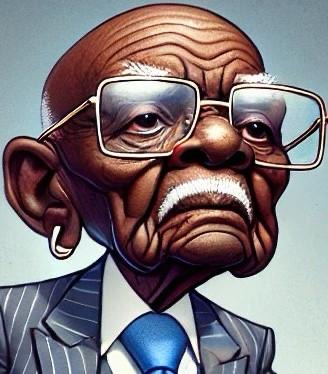Let me introduce you to my uncle, the inimitable, indomitable, and often incomprehensible Anganga Che Chitekwe.
A man of great history (which he frequently forgets) and grand ambitions (which he never lets us forget). At the ripe old age, Anganga Che Chitekwe remains the self-declared custodian of all wisdom, protocol, and public discourse—even if, on most days, he can’t remember where he left his walking stick.
In our family, Anganga Che Chitekwe is a living paradox. At home, he needs an aide-a patient and long-suffering man called James, to remind him to take his medication, locate his spectacles (which are usually on his forehead), and guide him safely to the bathroom lest he mistake the closet for the toilet again. But the moment he steps out into the public, something miraculous happens—he is suddenly transformed into the most energetic, loudest, and most confident statesman you have ever seen.
Take last Sunday, for instance. We attended a village meeting to discuss borehole maintenance. As soon as Anganga Che Chitekwe arrived, shuffling along with James in tow, he announced, in his signature grandstanding tone: “As your elder statesman and the only person here who truly understands water governance, I shall lead this meeting!”
Nobody had asked him to. Nobody wanted him to. But such details never matter to Anganga Che Chitekwe.
The village headman, a man at least forty years younger than him, attempted to regain control of the proceedings. “We appreciate your wisdom, Anganga, but as I was saying—”
“Nonsense!” Anganga Che Chitekwe barked. “Young people these days have no respect for tradition! Now, where is my gavel? James, fetch me a gavel! I shall call this meeting to order.”
James, ever the professional, whispered, “Sir, this is not Parliament. Also, you do not own a gavel.”
“Ah-ha! That is why this country is in shambles! No respect for proper order! No wonder our boreholes are drying up! In my day, when I was leading the great committee of water affairs—”
Yes, I forgot, Anganga Che Chitekwe was once a Member of Parliament and the Speaker of the National Assembly. However, he was never part of any such committee. But dare I correct him? Absolutely not.
For a man who needs assistance putting on his left shoe, he has the audacity of an army general leading his troops into battle. When the village meeting finally ended (three hours later than scheduled, thanks to Anganga Che Chitekwe’s “history lecture”), he beamed with pride, completely unaware that the only reason people clapped for him was to signal their relief that he had finally stopped talking.
This is the plight of my uncle. He is a man who cannot recognize his own wife on some days but insists on advising village and national leaders on governance. He forgets where he put his teeth, but he will never forget to remind us how he was the first person in the country to be a history professor, “not here in Nyasaland but in the land of azungu” (a claim which, like most of his stories, remains highly suspicious). His eyesight is failing, but not his ability to judge every decision made by anyone under the age of sixty.
James, his long-suffering aide, tells me that the mornings are the hardest. Everyday Anganga Che Chitekwe wakes up ready for battle, convinced he has urgent business to attend to. “James! Bring me my suit! The elders of the village are expecting me in an hour!”
“Sir, you have no meeting with the elders of the village today.”
“Aha! That is what they want you to think! Now hurry up, time is of essence!”
By the time he is dressed, had his porridge, and taken his pills, he forgets why he was in such a hurry in the first place. But in the afternoon, the cycle begins again. He will storm into public events, waving his walking stick like a scepter, issuing commands that nobody asked for, and complaining about how “the youth” have ruined the nation (which, in his world, includes anyone below seventy).
If there is one thing I have learned growing up in his shadow, it is this: the older he gets, the stronger his belief that the world simply cannot function without his input. Even when his input is outdated, unnecessary, or, quite frankly, incomprehensible.
So, dear comrades, I ask for your patience. I am here documenting the curious case of my uncle—a man who refuses to retire from relevance, a statesman without a state, a dad and granddad without his own children, and a man whose biggest enemy is the reality that with his old age time is also up for him to call the shots in the village and the whole nation.
At the moment I am trying hard attempting to reason with Anganga Che Chitekwe trying my best to keep him from appointing himself into the village’s committee of elders where he is already set to position himself as the chairperson. A subject for next time!




